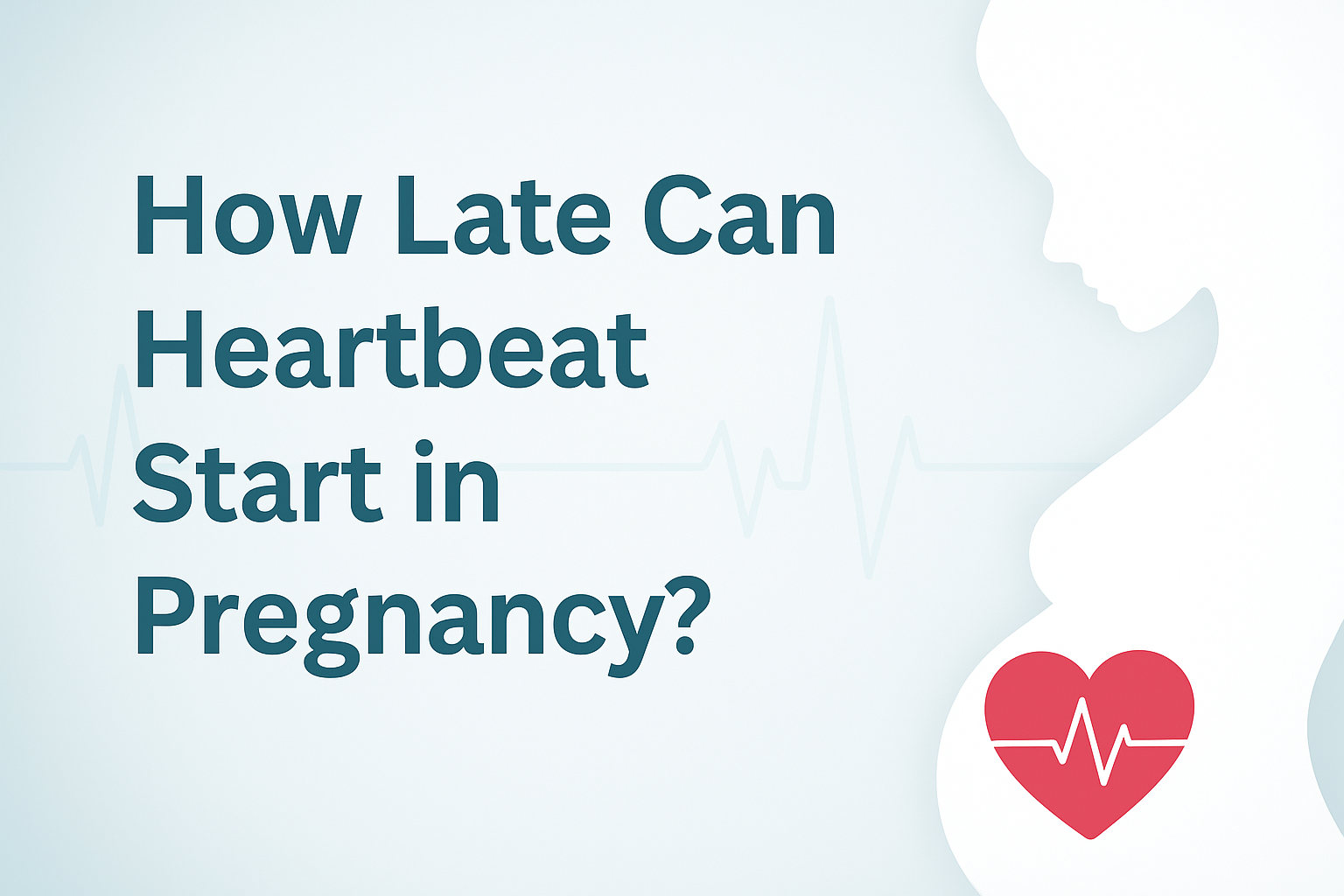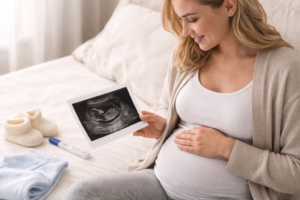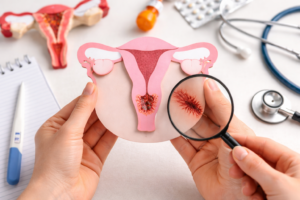Introduction
Hearing your baby’s heartbeat for the first time is one of the most exciting milestones of pregnancy. For many parents, this tiny thump-thump brings reassurance that the pregnancy is progressing well. But sometimes, during the early weeks, doctors may not detect the heartbeat right away—leading to anxiety and doubt. If you’ve ever wondered how late a heartbeat can start in pregnancy, you’re not alone. In this blog, we’ll explain when a heartbeat usually begins, why it may sometimes be delayed, what it means for natural and IVF pregnancies, and when to consult your doctor. At Ova Fertility and Women Care, Thane, we guide couples through every stage of their pregnancy journey with care and clarity.
When Does a Baby’s Heartbeat Start in Pregnancy?
- The fetal heart usually starts forming in week 5 of pregnancy.
- A heartbeat can often be detected by 6 to 7 weeks via transvaginal ultrasound.
- By 8 weeks, most pregnancies will show a visible flicker of the heartbeat.
- In some cases, the heartbeat may only be noticeable by 9 to 10 weeks, especially if calculated dates are slightly off.
Key Point: Every pregnancy is unique, and the timing of heartbeat detection can vary.
How Late Can a Baby’s Heartbeat Start?
The latest timeframe for detecting a heartbeat is usually by 10 to 12 weeks of pregnancy.
If no heartbeat is detected after 12 weeks, doctors may investigate further. However, in most healthy pregnancies, the heartbeat is visible well before that.
Factors like ovulation timing, embryo implantation delay, or ultrasound accuracy can affect when the heartbeat is first seen.
Why Might the Heartbeat Be Delayed?
Sometimes, it’s perfectly normal not to detect a heartbeat in early scans. Reasons include:
- Incorrect Gestational Age – If ovulation happened later than expected, the embryo may still be too small.
- Late Implantation – If the fertilized egg implanted later in the uterus, development may appear delayed.
- Ultrasound Limitations – Early scans may not always pick up the heartbeat clearly.
- Maternal Factors – A tilted uterus or higher BMI can make detection difficult.
- IVF Pregnancies – While usually monitored closely, IVF embryos may show slight variations in development.
Don’t panic if the heartbeat isn’t visible at 6 weeks. Doctors often recommend a repeat scan in 1–2 weeks before drawing conclusions.
Heartbeat Detection in IVF vs. Natural Pregnancies
At Ova Fertility and Women Care, many couples undergoing IVF treatment have similar concerns:
- IVF Pregnancy: Since the embryo transfer date is known, doctors can predict more precisely when the heartbeat should appear. Usually, it is seen around 6 weeks post-transfer.
- Natural Pregnancy: Ovulation and implantation may vary, so there is more flexibility in timing.
If no heartbeat is detected in IVF after 7 weeks, a follow-up scan is crucial.
Ultrasound and Heartbeat Timeline
- 5 weeks: Gestational sac visible
- 5.5–6 weeks: Yolk sac and early heartbeat may appear
- 6–7 weeks: Heartbeat usually visible on transvaginal ultrasound
- 8–10 weeks: Stronger, clearer heartbeat visible via abdominal ultrasound
- 10–12 weeks: Heartbeat can often be heard using a Doppler device
What If No Heartbeat Is Detected by Week 7–8?
If your doctor cannot detect a heartbeat by this time, they may:
- Recommend a repeat scan after 1–2 weeks
- Check hCG hormone levels to track pregnancy progress
- Advise supportive care until confirmation
Sometimes, pregnancies develop slower but continue healthily. However, in certain cases, it may indicate a missed miscarriage or other complications.
This is why early medical supervision is vital.
Common Concerns Parents Have
1. “I’m 7 weeks pregnant, but no heartbeat. Should I worry?”
Not always. It may simply be too early. Wait for a follow-up scan.
2. “Is it normal to detect heartbeats late in IVF pregnancy?”
Yes, slight delays are common. Close monitoring ensures clarity.
3. “Can stress or lifestyle affect when the heartbeat starts?”
No, the timing is biological and not caused by stress.
Signs of a Healthy Early Pregnancy (Before Heartbeat Detection)
Even before hearing a heartbeat, you may notice:
- Rising hCG levels in blood tests
- Growth of the gestational sac and yolk sac in scans
- Pregnancy symptoms: nausea, fatigue, breast tenderness
These are positive indicators until the heartbeat is visible.
When to Consult a Specialist?
You should seek immediate consultation if:
- You experience severe cramping or bleeding
- No heartbeat is visible by 10–12 weeks
- Your doctor advises further testing
At Ova Fertility and Women Care, our team ensures that you receive:
- Timely early pregnancy scans
- Accurate IVF monitoring
- Supportive guidance during anxious waiting periods
Emotional Impact of Waiting for the Heartbeat
For many couples—especially those undergoing IVF—waiting to hear the heartbeat can feel overwhelming. It’s important to remember:
- Every pregnancy develops differently
- Medical reassurance is more reliable than internet assumptions
- Professional counseling and support can reduce stress
Tips for Parents During Early Pregnancy
- Follow your doctor’s schedule for scans and blood tests
- Avoid over-Googling symptoms (it often causes unnecessary stress)
- Focus on nutrition, hydration, and prenatal vitamins
- Stay emotionally connected with your partner
- Trust your medical team
Why Choose Ova Fertility and Women Care?
- Expertise in IVF and IUI treatments in Thane and Mumbai
- Advanced facilities for early pregnancy monitoring
- Compassionate care that goes beyond medical treatment
- Affordable, ethical, and transparent approach
If you are concerned about your pregnancy heartbeat timeline, book a consultation with Ova Fertility and Women Care today.
- Frequently Asked Questions
Q1. How late can heartbeat start in pregnancy?
Q2. What if no heartbeat is detected at 7 weeks?
Q3. Can IVF pregnancies show a delayed heartbeat?
Q4. What’s the difference between natural and IVF pregnancy heartbeat detection?
Q5. When should I consult a doctor urgently?
Conclusion
The first heartbeat is one of the most cherished pregnancy milestones. While most heartbeats are detected by 6–8 weeks, some may appear slightly later due to natural variations. What matters most is consistent medical supervision and timely scans. At Ova Fertility and Women Care, Thane, we support couples through these sensitive stages with accurate monitoring, compassionate care, and advanced fertility treatments.
Remember: Every pregnancy is unique. Stay patient, stay hopeful, and trust your doctor.









 No need to worry, your data is 100% Safe with us!
No need to worry, your data is 100% Safe with us!